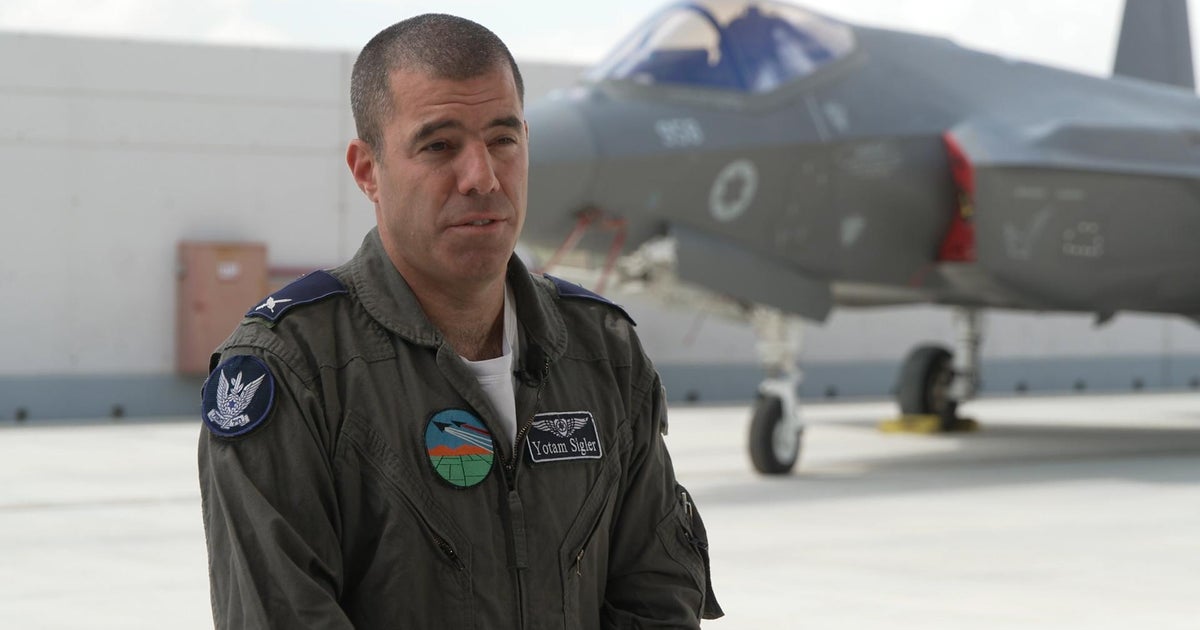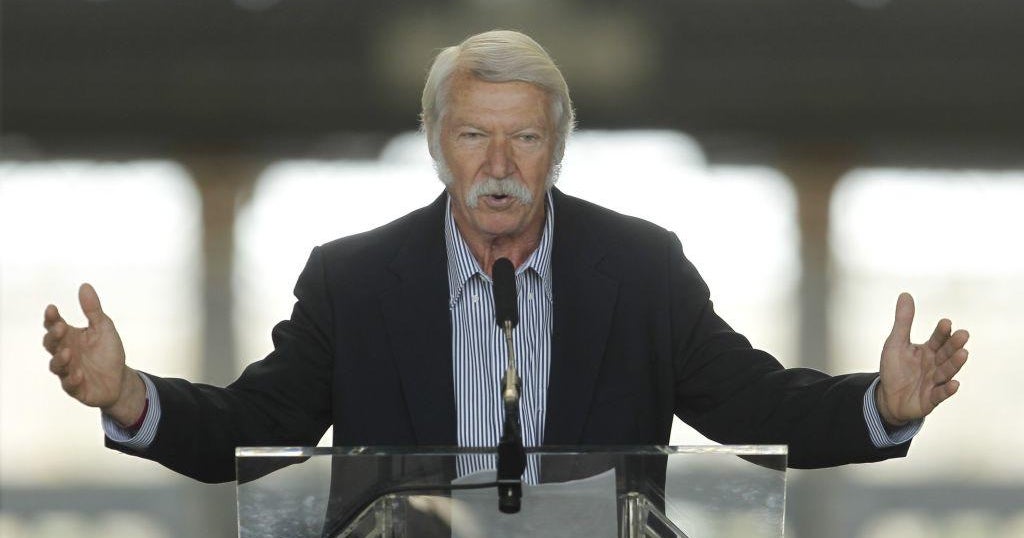CBS News
Israel preparing for Rafah invasion amid increasing tension with U.S. over humanitarian crisis in Gaza

Cecilia Vega (in studio): Lesley Stahl has spent a week on the ground in Israel, where its military is engaged on three fronts — with Hezbollah in the north, with Iran in the east and the ongoing war with Hamas in Gaza, that has created catastrophic civilian consequences.
Lesley Stahl: We’re at the Erez crossing into Gaza which is open at the moment, though the flow of aid trucks in has slowed to a trickle. This has been a week of high drama in Israel, first off we have the tension – increasing tension — with the United States over the imminent invasion of Rafah and President Biden’s punitive step in holding off the delivery of bombs that could be used in that invasion. There’s been a week of intense diplomacy with CIA Director William Burns here to try and breathe life into the ceasefire for hostages deal.
It’s been a month since Iran’s brutal attack with missiles and drones. But this has been a week of more hostilities. In the north, there’s an intensifying of the not-much-covered battle with Hezbollah. And in the south, Israel is surrounding Rafah.
Israeli tanks inched in. There were huge explosions and exchanges of fire with Hamas. More images of misery, as shortages of food and fuel become dire. Refugees from the north of Gaza who had taken shelter here were being instructed by the Israeli military, the IDF, to move — again.
Omer Tischler: What’s going right now is a very– specific operation being run by the IDF, a very accurate one, on the east part of Rafah.
Brigadier General Omer Tischler is second in command of the Israeli air force.
Lesley Stahl: If what you’re saying is true, how come we’re seeing what looks like indiscriminate bombing?
Omer Tischler: I understand and I feel sorry. But the bottom line is Hamas dragged us into that kind of war.
60 Minutes
Lesley Stahl: President Biden has been a steadfast ally and supporter of Israel and that support of Israel is hurting him. And now the Biden administration has already stopped sending weapons, 3,000 bombs for Israeli fighter planes.
Omer Tischler: I won’t talk about the specific report. What I’ll talk about is our strong relationship with the United States. I know that we will keep on working together with our partners, with our friends, and with the United States.
Lesley Stahl: In terms of American opinion, things have shifted against Israel because of these images of all the civilians, horrible scenes of devastation. There’s I guess two wars. There’s a war on the ground. And then there’s a war of public opinion. And you’re losing that war.
Omer Tischler: I don’t know about that.
Lesley Stahl: I’m telling you.
Omer Tischler: Maybe you’re right. What we are doing, what we’re trying to do, and just to remind us where it all happened, where it’s– when this all started. It started with a brutal, brutal attack by Hamas killing 1200 people at the seven of October.
Since then, over 34,000 Palestinians have been killed in Gaza according to the U.N. While Israel is engaged with Iran-backed Hamas along Israel’s southern border, another Iran-backed group, Hezbollah, has ramped up its attacks from the north.
Lesley Stahl: We’re in Kiryat Shmona, a city just 15 minutes from the border with Lebanon. Right now Hezbollah is sending drones and rockets into this area. We can hear the booms going off – one after the next. So far, at least two Israeli soldiers have been killed today. And we can also hear the Israeli counterattack. Now, this fight is not as intense as the one in Gaza, but it’s serious enough that Israel evacuated more than 60,000 people – emptying out the entire northern part of the country.
The loss of the north feels to Israelis like a wound, an amputation, a humiliation. We drove up to the border, to the abandoned and partly destroyed small town of Metula. This Hezbollah video shows near daily missile attacks pummeling the town.
Liat Cohen-Raviv is one of a handful of residents still in Metula who spend their days underground in this bunker complex.
Liat Cohen-Raviv: The most safe spot in Metula these days.
She led us into their war room, where they monitor incoming fire from the hillsides of Lebanon, an area also deserted. 90,000 Lebanese were forced to flee.
60 Minutes
Lesley Stahl: How long does it take for a missile to come over here?
Man (mayor): 8 or 20 seconds.
Lesley Stahl: 8 to 20 seconds?
Man (mayor): Yes
Liat Cohen-Raviv: Another drone coming in. Sorry
Twenty minutes after we got there, reports of a drone overhead carrying explosives.
Liat Cohen-Raviv: Quickly please.
We left the war room and moved to another room.
Lesley Stahl: I keep hearing the noise overhead. I know we’re locked in here. What’s happening?
Liat Cohen-Raviv: So currently we have a suicide drone. You can hear the alerts coming in as we speak. And it’s above us and what’s happening now is that the army is trying to respond to it and to shoot it down.
Lesley Stahl: And those are alerts?
Liat Cohen-Raviv: These are alerts.
Lesley Stahl: To us.
Liat Cohen-Raviv: Yes.
Lesley Stahl: To stay inside.
Liat Cohen-Raviv: Stay inside.
Outside the army was coming to rescue two soldiers who were wounded – and would later die. After we’d been there an hour, a pause in the fighting –
Shachar Bar-On: He wants us to leave one after the other to have the cars just drive right out of here.
Daniel Pritchard: All of our team, come into, come into this.
(Out of shot): Go, go, come!
Lesley Stahl: Go, let’s go.
60 Minutes
We drove as fast as we could as the fighting picked up again.
Lesley Stahl: So would you say that you are fighting a multi-front war right now?
Omer Tischler: It is, yes.
General Tischler calls the fight with Hezbollah one part of a 360-degree war with Iran. He gave us a rare tour of Israeli air force headquarters, which they taped for us, with no sound and blurred for security reasons. He showed us where he sat the night of April 13, when Iran blitzed Israel from its own soil for the first time, to retaliate for the assassination in Damascus of a top Iranian general.
Iran launched a massive synchronized attack of some 170 suicide drones, over 30 cruise missiles that fly low and fast like jets, and over 120 ballistic missiles.
The skies across the Middle East lit up as pilots shot down the drones and cruise missiles.
Israel’s advanced “Arrow” system took down ballistic missiles in the outer atmosphere.
Only a handful of all that made it through.
Omer Tischler: ‘Til that night Iran attacks us using its proxies from Yemen, from Iraq, from Syria, from Lebanon. But on that night Iran attack Israel directly.
Lesley Stahl: Do you think that it’s possible that Iran chose to do this because it perceived Israel right now as being weak? You’re arguing with the Americans, all kinds of issues with Gaza.
Omer Tischler: Iran attacked us with all their capabilities and they failed. And Iran knows that we are capable of attacking at any given time.
One reason Iran failed was because a surprising coalition joined forces to help Israel, including several Arab states like Saudi Arabia, Jordan, the Emirates, Bahrain, Qatar.
Omer Tischler: I’ll say that what happened at that night –on the night was historic. But we didn’t do it on our own. We’ve done it with our partners.
Lesley Stahl: Are you talking about the Saudis and the Jordanians?
Omer Tischler: We’re flying with the U.S., with the Brits, with the French, and I’ll not talk– I don’t think it will be wise to talk about other countries.
Lesley Stahl: But, you know, that is the most interesting part of all this, it’s almost unfathomable to think that these Arab countries would come into the air to defend Israel.
Omer Tischler: What’s clear now is that Iran poses threat to the region. And we should act together against Iran.
Lesley Stahl: But, you know something? The Arab countries are refusing to admit they participated. What do you make of that?
Omer Tischler: We’re not talking. We’re acting. So less words and more actions.
Lesley Stahl: Were you at all surprised that all those Arab countries came into this coalition with Israel, given what’s going on in Gaza?
Tamir Hayman: Given the context of Gaza?
Lesley Stahl: Yeah.
Tamir Hayman: Unbelievable.
60 Minutes
Tamir Hayman is former head of Israeli army intelligence, now head of the Institute for National Security Studies.
Lesley Stahl: Well, what did these other countries really do, like Saudi Arabia, and Bahrain, and Jordan?
Tamir Hayman: Well, the main issue is early detection. If you have a network of radars spread all over the Middle East, connected into one central hub, which is maybe American one, you give– you– you spread a network of detection that should give you enough time to be prepared.
Days after the attack, a group of Orthodox men found a ballistic missile in the desert that was successfully shot down by the army. Another one was found floating in the Dead Sea. Both were brought to this army base for forensic analysis.
No one was killed that night; one girl was injured from falling debris.
Lesley Stahl: Oh, so this is the hole. This is where–
But four ballistic missiles did hit the Nevatim air force base. Base Commander Yotam Sigler showed us one point of impact. His base was one of Iran’s main targets because it’s home to Israel’s fleet of stealth F-35s.
Lesley Stahl: Were any of your– F-35s damaged in any way?
Yotam Sigler: No.
Lesley Stahl: But what they did prove– to you, to themselves and to the world, is that they could send a ballistic missile from Iran and hit Israel.
Yotam Sigler: Yeah. It is a big deal.
Lesley Stahl: So if those four had hit, and they had nuclear weapons on them, this must terrify Israel?
Yotam Sigler: Yeah, it terrifies not only Israel but the Middle Ea– the Middle East.
60 Minutes
The U.S. and Israel consider the battle of April 13 a win – but so does Iran.
Lesley Stahl: President Biden issued a public warning to Iran: “Don’t attack, don’t do this” several times and they did, they defied him.
Tamir Hayman: From their eyes it’s a strategic victory. They have stood against a direct threat by the most powerful nation in the world and defied it.
Tamir Hayman is concerned about Israel’s future with the U.S.
Tamir Hayman: We are worried about the internal trends inside Israel and the internal long-term trends inside the United States. What happened right now in the universities in the United States is just acceleration of a phenomena that was well observed I think a year ago. That is that we have a challenge on maintaining the common values which are the basics of those– of the special connection relationship with the United States. We are drifting apart and it’s a strategic threat that we need to address.
Prime Minister Benjamin Netanyahu tested the “special relationship” this week with a public message for President Biden: that the incursion into Rafah is on with or without the U.S. weapons.
Prime Minister Benjamin Netanyahu: “If Israel is forced to stand alone, Israel will stand alone.”
The week here ended with the points of contention even more acute. The U.N. says it could run out of food to distribute to Gaza as soon as today. Here in Tel Aviv, the hostage families continue their vigil as some of their protests have turned into violent clashes with the police.
And CIA Director William Burns left the region, with no progress on the cease-fire for hostages negotiations.
Produced by Shachar Bar-On and Jinsol Jung. Broadcast associate, Aria Een. Edited by Peter M. Berman.
CBS News
Woman gives emotional testimony in Idaho abortion ban case

Watch CBS News
Be the first to know
Get browser notifications for breaking news, live events, and exclusive reporting.
CBS News
Palestinians hope Trump will end the war in Gaza

Watch CBS News
Be the first to know
Get browser notifications for breaking news, live events, and exclusive reporting.
CBS News
Bela Karolyi, polarizing U.S. gymnastics coach, dies at 82

Bela Karolyi, the charismatic if polarizing gymnastics coach who turned young women into champions and the United States into an international power, has died. He was 82.
A spokesperson for USA Gymnastics confirmed to CBS News by email that Karolyi died Friday. No cause of death was given.
Karolyi and wife Martha trained multiple Olympic gold medalists and world champions in the U.S. and Romania, including Nadia Comaneci and Mary Lou Retton.
Ron Jenkins/Fort Worth Star-Telegram/Tribune News Service via Getty Images
“A big impact and influence on my life,” Comaneci, who was just 14 when Karolyi coached her to gold for Romania at the 1976 Montreal Olympics, posted on Instagram.
The Karolyis defected to the United States in 1981 and over the next 30-plus years became a guiding force in American gymnastics, though not without controversy. Bela helped guide Retton — all of 16 — to the Olympic all-around title at the 1984 Games in Los Angeles and memorably helped an injured Kerri Strug off the floor at the 1996 Games in Atlanta after Strug’s vault secured the team gold for the Americans.
Karolyi briefly became the national team coordinator for USA Gymnastics women’s elite program in 1999 and incorporated a semi-centralized system that eventually turned the Americans into the sport’s gold standard. It did not come without a cost. He was pushed out after the 2000 Olympics after several athletes spoke out about his tactics.
It would not be the last time Karolyi was accused of grandstanding and pushing his athletes too far physically and mentally.
During the height of the Larry Nassar scandal in the late 2010s — when the disgraced former USA Gymnastics team doctor was effectively given a life sentence after pleading guilty to sexually assaulting gymnasts and other athletes with his hands under the guise of medical treatment — over a dozen former gymnasts came forward saying the Karolyis were part of a system that created an oppressive culture that allowed Nassar’s behavior to run unchecked for years.
Still, some of Karolyi’s most famous students were always among his staunchest defenders. When Strug got married, she and Karolyi took a photo recreating their famous scene from the 1996 Olympics, when he carried her onto the medals podium after she vaulted on a badly sprained ankle.













